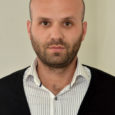By 2002, Kosovo had emerged from wartime, and a period of reconstruction was beginning for the country, including within its sports federations. A hunt began for a new head for the Boxing Federation. With no shortage of former legends to choose from for the role, speculation surrounding the appointment was rife. Would it be Olympic bronze medalist Aziz Salihu? Or one of Kosovo’s former champions of Yugoslavia like Mehmet Bogujevci, Xhevdet Peci, or even Nazif Gashi?
Eventually, none of these men would go on to lead the federation, and the role would be filled by a man who had never entered the ring in a competitive bout; Ramadan Selimi, who still holds the position to this day, nearly 15 years later.
Selimi is the brother of former influential Kosovo Liberation Army member and current Vetevendosje deputy Rexhep Selimi. Familial ties between heads of sporting federations and senior politicians in Kosovo has become something of a trend, and allegations have emerged that Selimi secured and has maintained his position through political connections.
Selimi rejects this accusation, insisting that he was chosen fairly and that he maintained the position thanks to the work he put in. “[The allegation] has no basis, because in 2002 my brother was not a politician,” he told K2.0. “I became the head of the federation earlier.”
Selimi explains that he was part of the management team at Prishtina Boxing Club when he was proposed for the role at the federation in 2002. “Initially, I hesitated, as I could not see myself becoming the head [of the federation] ahead of boxing aces like Bogujevci, Salihu, Peci, Gashi and many, many more,” he revealed. “At first I declined, but then seeing the circumstances, seeing that they could not find a common ground, [I decided that] maybe I should lead the Boxing Federation.”
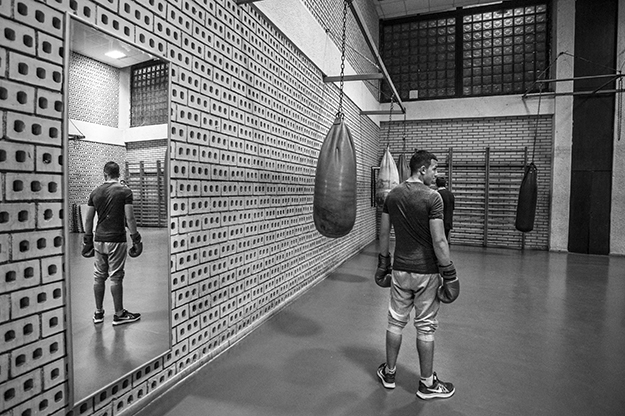
Prishtina Boxing Club at The Palace of Youth and Sports is an official affiliate of the Kosovo boxing federation. Photo: Atdhe Mulla / K2.0.
In regard to his credentials, Selimi points to his experience with managing and organizing cultural activities, and insists that it is not absolutely necessary for the head of a federation to have been a successful athlete in their respective field. “It is important to be a good manager,” he said. “People that have both these attributes are very rare. I think I’ve been a good manager and have achieved my goals. I’m truly happy with myself.”
Despite Selimi’s satisfaction with his nearly 15 year career, many people that have interacted with the Kosovo Boxing Federation under his tenure seem a lot less happy. Some of Kosovo’s most successful boxers believe that the Boxing Federation is drenched in politics.
Armend Xhoxhaj is a light heavyweight boxer from Prizren, currently ranked at number 53 in the world in his weight category by the European Boxing Confederation and the winner of the Kosovo Boxing Federation’s ‘Boxer of the Year’ award in both 2015 and 2016.
Despite the accolades from the federation, Xhoxhaj has a less than positive opinion of its practices. “There are many people within that are involved in politics, not only the head, Ramadan Selimi,” Xhoxhaj told K2.0. “I don’t want to deal with them any more.”
Xhoxhaj has been left disappointed with the conditions for boxers in Kosovo, and is thinking about moving abroad to better pursue his career. It is a move another boxer, Naser Shala, has already undertaken.
Shala was Kosovo’s champions for six years running, but told K2.0 that his career could not grow with Selimi as the head of the federation. “Ramadan Selimi was never involved in boxing and thus has no knowledge of it,” he said. “He is where he is, and has stayed where he is, because of politics,” says the boxer from Prizren, who is now pursuing a career in the Netherlands.
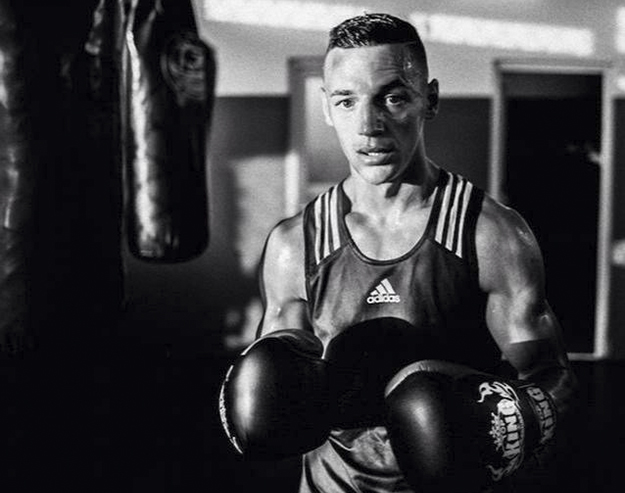
Kosovo’s six time boxing champion, Naser Shala claims his family’s political associations prevented him from competing in the Olympics. Photo courtesy of Naser Shala.
It is the influence of politics over the federation that he believes most hampered his career in Kosovo: “[Selimi] personally, together with the head of the Kosovo Olympic Committee, took me out of the Olympics, since one of my family members is a PDK affiliate and a member of the Municipal Assembly of Prizren. Kosovar boxing is heavily influenced by politics.”
These sentiments are echoed by young Prishtina based boxer Arian Gashi, who is also considering pursuing his career outside of Kosovo, having given up his career in his home country over a year ago after being continually disappointed by conditions. He told K2.0 that “there are some clans that have seized the federations,” adding that he doesn’t foresee any bright days ahead for Kosovar boxing.
Alongside politics, another major point of contention is money. Gashi, Shala and Xhoxhaj all insist that they have honored the spirit of amateur boxing and have never taken a penny during their career. Shala believes the same could not be said of the management of the federation, whom he claims have rarely used the federation’s budget in the best interest of its boxers.
Xhevdet Peci was a four time boxing champion of Yugoslavia, and voted as Mitrovica’s sportsman of the century in 2000. Peci now trains boxers across the country, with whom he often travels to competitions. “One time we were at a tournament abroad and the federation only covered our travel [expenses],” he told K2.0. “Believe me, I spent my own money to pay for coffee and food. This is the reality of Kosovar boxing.”
Similar stories are also told by Xhoxhaj, Shala, Gashi and Liridon Zeqiri, once the best boxer in the country. Shala mentioned cases in which he was forced to take out loans just to cover the necessary expenses and be able to do what he loves — to box.
K2.0 put these allegations to Selimi. In place of a defence of the conduct of his federation, Selimi answered his critics by insisting that it is not the right time to make accusations against a developing organization. He also criticised athletes who leave the country, at “a time when Kosovar athletes developed abroad are now seeking to return and represent Kosovo.”
A separation of sport and state
The Kosovo Boxing Federation is not the only Kosovar sporting body that has faced accusations of political influence. Until recently, the Kosovo Football Federation had two politicians on its Executive Committee — deputies in the Kosovo Assembly, Bekim Haxhiu-Kamishi of the Democratic Party of Kosovo (PDK) and Murat Hoxha of the Democratic League of Kosovo (LDK). They both resigned on October 11, 2016, at UEFA’s request.
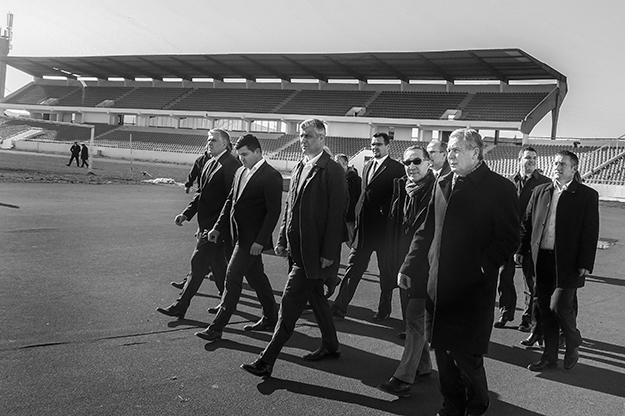
A group of state officials including Bekim Haxhiu-Kamishi visit the Adem Jashari stadium to inspect construction works. Photo courtesy of the Prime Minister’s Office.
UEFA has strict rules preventing political interference in football. However, Kosovar football, is still yet to be completely cleansed from political figures. While Haxhiu-Kamishi and Hoxha have gone, Vjollca Krasniqi, who has previously served in the Kosovo Assembly as a deputy, is still on the committee. Muharrem Sahiti meanwhile, works both as an advisor to the government in the Ministry of Culture, Youth and Sports and as an assistant to the Kosovar national team.
It’s not just the boxing federation that has relatives of politicians in senior positions. The Federation of Mountaineers and Alpinists of Kosovo is led by Arben Lila, the husband of the mayor of Gjakova, Mimoza Kusari-Lila, while the president of the Wrestling Federation of Kosovo, Naim Muja, is the brother of PDK politician Shaip Muja.
Meanwhile, the former Minister for Culture, Youth and Sports and current Minister for Agriculture, Memli Krasniqi, sits on the Executive Board for Kosovo’s Olympic Committee, as does his former advisor Shasivar Haxhijaj, who is also the chairman of the Istog branch of PDK.
It’s a phenomenon that has worried leading sporting figures across Kosovo, who, whilst acknowledging that government contributions to sport are vital, stress the need for a separation of sport and state.
Besim Hasani is the head of Kosovo’s Olympic Committee. He believes that the relationship between politics and sport must be supportive but distinct. “Politics must be close to sport and must support it, but it must never interfere in sport,” Hasani told K2.0. “Sports organizations are independent and autonomous. Independence and autonomy require good governance of sports organizations and a good and responsible overall management.”
It is a view echoed by Iber Alaj, the head of the Department of Sport at the Ministry of Culture, Youth and Sports. Alaj though, believes that Kosovo has yet to achieve this goal. “Despite attempts by sports institutions to escape the grips of politics, I think that as a society we are still in the initial stages, after obtaining full recognition by international organisations,” he told K2.0. “We need to divide political responsibilities for creating favorable conditions for sports at local, as well as central levels.”
However, Alaj points out that federations also have a duty to the state. “We must demand that sports organizations represent national values in sports, in harmony with the Kosovo Constitution and laws that are in force,” he stated. “I think that [currently] the separation of responsibilities in the management of sports organization is done spontaneously.”
A position for life
As well as political influence, another governance issue the federations face is a lack of change in senior positions. In Kosovar sports, the same people have led the federations for decades on end. The aforementioned Besim Hasani has kept his position at the head of the Olympic Committee for over 20 years while heads of other sports federations are following suit, holding their positions for long mandates with no limits.
Halil Sylejmani has been president of the Athletics Federation since Sept. 21, 1991, and will continue for another four years; by the time his term ends, he will have spent nearly 30 years at the head of the federation. Also about to start another four year term is the president of the Kickboxing Federation, Fatmir Makolli, who began his role nine years ago, around the same time that Fadil Vokrri took over the Football Federation.
Xhavit Kajtazi is a volleyball trainer and a well-known sports journalist often nicknamed ‘the professor.’ He suggests new blood is needed in senior positions at sports institutions. “I think that just about all the federations have been led by the same people for more than 25 years,” Kajtazi told K2.0. “The same leaders, the same heads… Without introducing new people and getting rid of these eternal heads — as well as others within the committees; people that have nothing left to give to sport, or are out of creativity — it will be hard to progress. It is as if they have inherited these positions, and they don’t even care!”
Recognition but no support
Whenever Kosovar athletes have achieved international success, politicians from the country have been quick to bask in their reflected glory. After Majlinda Kelmendi’s gold medal success at Rio 2016, President Hashim Thaci announced in a Facebook post that he was proud and full of emotion at Kelmendi’s success. Thaci insisted that the judoka “personifies the new history of sport and international success in Kosovo,” claiming that she had “scored ‘ipon’ [sic] for Kosovo’s foreign policy.”
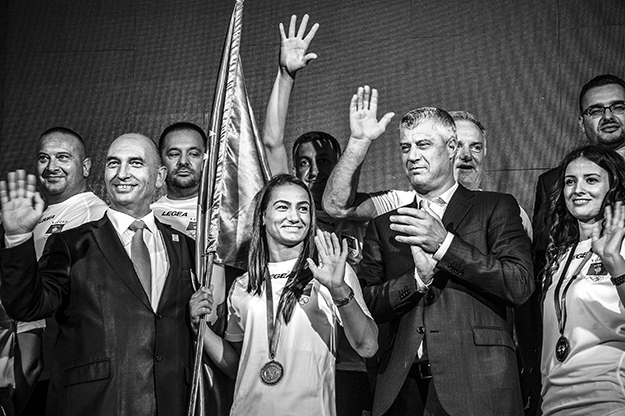
Olympic champion Majlinda Kelmendi alongside President Hashim Thaci, who claimed the judoka “had scored ipon [sic] for Kosovo’s foreign policy.” Photo: Atdhe Mulla / K2.0.
There are even more extreme cases. Qendrim Guri from Ferizaj is the only cyclist that represented Kosovo in the Rio Olympics last year. During his stay in Brazil, he was involved in a traffic accident, hitting a car while cycling and breaking his teeth. On returning home, he was offered no support from either the Kosovo Athletics Federation or the Olympic Committee. “I did not receive any help,” Guri told K2.0. “No-one even cared. I had to fix my teeth by myself. My father helped. The new teeth cost about 700 euros.”
Another Olympic athlete, Vijona Kryeziu, also found herself with medical bills last year, this time due to weak infrastructure in Kosovo. She was involved in an accident while running on the athletics track at the ‘Adem Jashari’ Olympic Stadium in Mitrovica, which left her bloodied and heavily injured. Kryeziu blamed the renovation of the stadium for her injuries, stating that the track was uneven. She was forced to stay at home for weeks as a result of her injuries and even considered ending her career early, at the age of only 18.
“It was terrible. I saw myself bloodied and thought that it is not worth pursuing a career in athletics in my country,” Kryeziu told K2.0. “I came from a paradise in Brazil, where everything was perfect during the Olympics, and now I was running in bumpy Kosovo. However, a few weeks later, I found the will to carry on with the hope of a better future.”
‘A better future’ is what many sportsmen and sportswomen, not to mention the public, are hoping for from Kosovar sport. However, to replicate and go beyond some of the dizzying highs Kosovar sport has already achieved, athletes need good working conditions and consistent support from their respective federations. For this to be possible, Kosovo’s sporting federations must be governed cleanly with support from the state, but not influenced by the individuals that run it.K
Feature image: Atdhe Mulla / K2.0.

Back to Monograph on Sports






